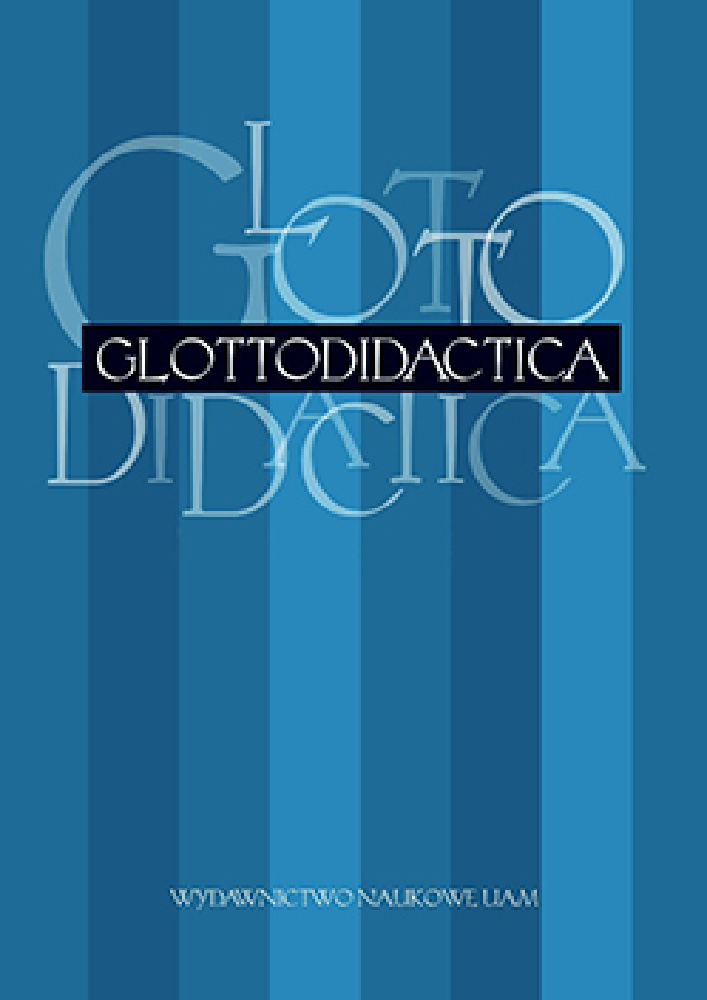Abstract
Intercultural (foreign language) teacher training tends to concentrate on selective case studies developed to show communicative problems, caused by their very special intercultural and multilingual characteristics. It also tends to make a big promise of a rapid improvement in intercultural communication in a multicultural and multilingual society by transferring the solutions for intercultural communicative problems to the students’ own experience. Such an approach fails to take into account the fact that encounters with inadequate communicative acts (behaviours/speech acts) determined by cultural and/or language differences are a daily experience of everybody and require a lot of communicative effort in order to prevent intercultural problems before they happen. The following article discusses what is meant by communicative effort, how past studies on the intercultural competence of (foreign language) teachers account on communicative effort, and how to prepare students to undertake communicative effort in their daily communicative activities in a multicultural and multilingual society.
Literaturhinweise
Agar, M. H. (1994). Language shock: Understanding the culture of conversation. New York: William Morrow.
Bailey, K. M. (1983). Competitiveness and anxiety in adult second language learning: Looking at an through the diary studies. In: H. W. Seliger, / M. H. Long (Hrsg.), Classroom oriented research in the second language acquisition (S. 67–103). Rowley: Newbury House.
Błażek, A. (2008). Evaluation interkultureller Kompetenz bei angehenden Deutschlehrerinnen und -lehrern in Polen. Poznań: Wydawnictwo Naukowe UAM.
Błażek, A. (2018). Einheit in Vielfalt: der Bologna-Prozess. Fachlexikologische und fachkommunikative Aspekte. Berlin: Frank & Timme.
Byram, M. (1997). Teaching and assessing intercultural communicative competence. Clevedon: Multicultural Matters.
Clark, H. H. (1996). Using language. Cambridge: University Press. DOI: https://doi.org/10.1017/CBO9780511620539
Ehlich, K. / ten Thije, J. D. (2010). Linguistisch begründete Verfahren der Analyse interkultureller Kommunikation. In: A. Weidemann / J. Straub / S. Nothnagel (Hrsg.), Wie lehrt man interkulturelle Kompetenz. Theorien, Methoden und Praxis in der Hochschulausbildung. Ein Handbuch (S. 265–285). Bielefeld: transcript Verlag. DOI: https://doi.org/10.1515/9783839411506-009
Fix, U. (1993). Sprachbiographien. Der deutsch-deutsche Sprachgebrauchswandel im Erinnern und Erleben von Zeitzeugen. In: I. Gamer-Wallert / E. Blumenthal / G. Klinger (Hrsg.), Nähe und Ferne. Erlebte Geschichte im geteilten und vereinigten Deutschland (S. 78–95). Tübingen: Attempto.
Franceschini, R. (2004). Sprachbiographien: das Basel-Prag-Projekt (BPP). In: R. Franceschini / J. Miecznikowski (Hrsg.), Leben mit mehreren Sprachen. Vivre avec plusieurs langues (S. 121–145). Bern, Berlin et. al.: Peter Lang.
Garfinkel, H. (1967). Studies in Ethnomethodology. Cambridge: Polity Press.
Garfinkel, H. (2006 [1948]). Seeing Sociologically. The Routine Grounds of Social Action. Lanham: Rowman & Littlefield.
Gogolin, I. (1994). Der monolinguale Habitus der multilingualen Schule. Münster: Waxmann.
House, J. (1998). Kontrastive Pragmatik und interkulturelle Kompetenz im Fremdsprachenunterricht. In: K.-D. Baumann / H. Kalverkämper (Hrsg.), Kontrast und Äquivalenz. Beiträge zu Sprachvergleich und Übersetzung (S. 63–88). Tübingen: Narr.
Kiefer, K.-H. (2013). Kommunikative Kompetenzen im Berufsfeld der internationalen Steuerberatung. Frankfurt am Main: Peter Lang. DOI: https://doi.org/10.3726/978-3-653-02916-1
Krumm, H.-J. (2010). Mehrsprachigkeit in Sprachenporträts und Sprachenbiographien von Migrantinnen und Migranten. Arbeitskreis Deutsch als Fremdsprache (AkDaf) Rundbrief 61, 16–24.
Niemierko, B. (1999). Pomiar wyników kształcenia. Warszawa: WSiP.
Pilch, T. / Bauman, T. (2001). Zasady badań pedagogicznych. Warszawa: Wydawnictwo Akademickie „Żak”.
Rößler, S. (2007). Eine qualitative Studie zur Entwicklung interkultureller und pädagogischer Kompetenz bei den Lehrern in Schulen Niedersachsens und Sachsen-Anhalts. Magdeburg: Docupoint.
Sercu, L. (2004). Assessing intercultural competence: a framework for systematic test development in foreign language education and beyond. Intercultural Education, 15 (1), 73–89. DOI: https://doi.org/10.1080/1467598042000190004
Spradley, J. P. (1979). The ethnographic interview. New York: Holt, Rinehart and Winston. ten Thije, J. (2002). Stufen des Verstehens bei der Interpretation von interkulturellen Diskursen. In: H. Kotthoff (Hrsg.), Kultur(en) im Gespräch (S. 61–98). Tübingen: Gunter Narr Verlag.
Lizenz
Copyright (c) 2018 Agnieszka Błażek

Dieses Werk steht unter der Lizenz Creative Commons Namensnennung - Keine Bearbeitungen 4.0 International.
Authors
Authors of texts accepted for publication in Glottodidactica are required to complete, sign and return to the editor's office the Agreement for granting a royalty-free license to works with a commitment to grant a CC sub-license.
Under the agreement, the authors of texts published in Glottodidactica grant the Adam Mickiewicz University in Poznań a non-exclusive, royalty-free license and authorize the use of Attribution-NoDerivatives 4.0 International (CC BY-ND 4.0) Creative Commons sub-license.
The authors retain the right to continue the free disposal of the work.
Users
Interested Internet users are entitled to use works published in Glottodidactica since 2016, under the following conditions:
- attribution - obligation to provide, together with the distributed work, information about the authorship, title, source (link to the original work, DOI) and the license itself.
- no derivatives - the work must be preserved in its original form, without the author's consent it is not possible to distribute the modified work, such as translations, publications, etc.
Copyrights are reserved for all texts published before 2016.
Miscellaneous
Adam Mickiewicz University in Poznań retains the right to magazines as a whole (layout, graphic form, title, cover design, logo etc.).





